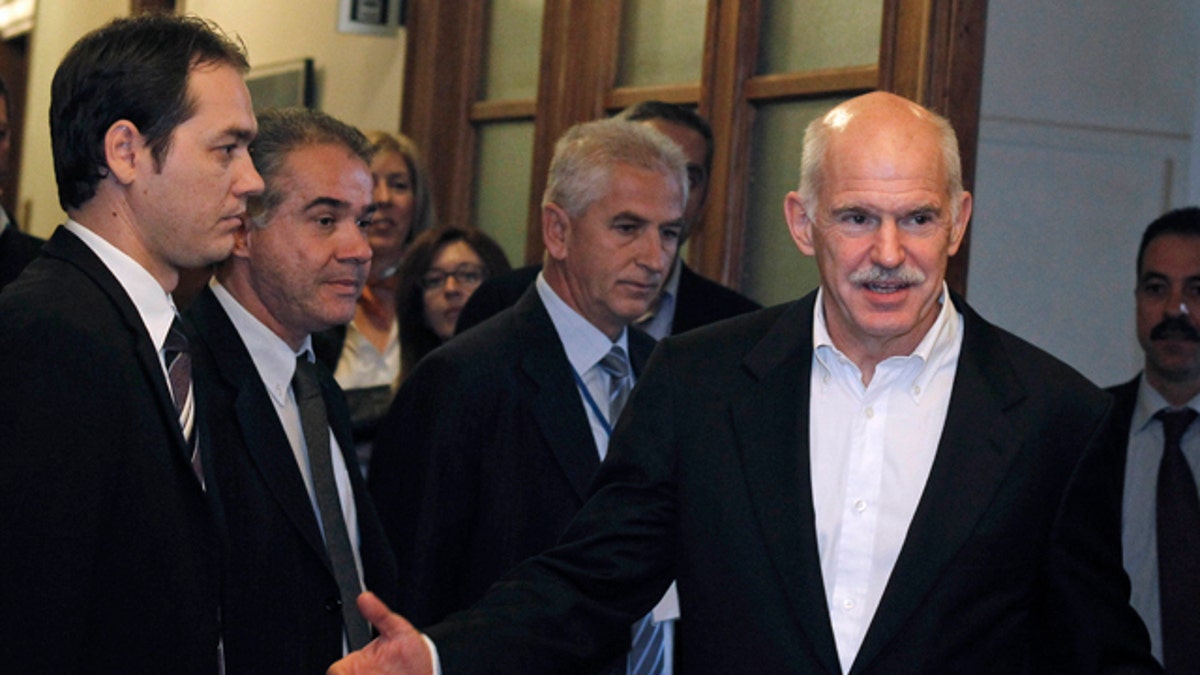
Nov. 8, 2011: Greek Prime Minister George Papandreou, right, gestures as he arrives for a cabinet meeting at the parliament in Athens. (AP)
ATHENS, Greece-- Greece's opposition leader has blamed the governing Socialists for a delay in critical power-sharing talks that saw political leaders leave a top-level meeting without naming a new prime minister.
Antonis Samaras said his conservative party "will not become part of the problem" and that according to the country's constitution, the initiative for naming a candidate to head a new interim government lies with the governing Socialist party.
The talks degenerated into confusion Wednesday night, shortly after Papandreou said the country's two main parties had reached an agreement to form an interim coalition government to secure a new euro130 billion ($177 billion) debt deal and keep the country in the euro.
A result had initially been expected Monday night from power-sharing negotiations between Premier George Papandreou's Socialists and the opposition conservatives led by Antonis Samaras.
But the talks dragged on for three days despite intense European and domestic pressure for a quick end to the political crisis that has endangered Greece's continued bailout funding and position in the euro.
"Today the main political forces are joining together, to guarantee to Greece's citizens that in the following months we will do whatever is necessary not only to secure the country's position in the euro and implement the (debt deal) decisions ... but also to make use of its great benefits,"Papandreou said in a televised address.
He then headed to a meeting with President Karolos Papoulias, where he was expected to formally resign -- half way through his four-year term. Papandreou wished the next prime minister well, but gave no indication of who it would be.
Former European Central Bank vice president Lucas Papademos had been widely tipped as the strongest candidate for interim prime minister. But two officials from the main parties said that by Wednesday afternoon another strong candidate had emerged -- current parliamentary speaker and former justice and public order minister Philippos Petsalnikos.
"Today, despite our political and social differences, we are setting aside the sterile conflicts," the 59-year-old Papandreou said. "A government of political forces is taking over that goes beyond parties and personal biases."
The political crisis erupted last week, when Papandreou said he would put the new European rescue package to a referendum. Other eurozone nations were horrified by the delay, markets around the world tanked and Greece's international creditors froze the payment of the next euro8 billion ($10.9 billion) bailout installment, without which the country will default on its debts.
Faced with international anger and a backlash from within his own Socialist party, where lawmakers were calling for him to resign, Papandreou withdrew the referendum plan Thursday, saying it was no longer necessary after the opposition indicated they would support the deal.
Earlier this week, eurozone finance ministers said the heads of the two main parties had to commit in writing to the terms of the country's bailouts before Athens can receive the next loan installment.
There has been intense speculation in recent days as to who will take over from Papandreou, but the outgoing premier offered only vague hints as to who it might be.
"It was clear that to achieve this effort we would have to agree on a person who would unite us and would be supported by all of us," he said. "I believe the choice we have made is in line with the institutions and will boost the democratic institutions."
Papandreou said the creation of the new interim government was also a way of "sending a strong message to our partners and the international community that we Greeks know how to shoulder our responsibilities, we know how to cooperate, to roll up our sleeves and unite in times of hardship."
Greece's president later convened a meeting of political leaders with Papandreou, Samaras and Giorgos Karatzaferis, the head of a smaller right-wing party, to discuss the interim government.
But Karatzaferis stormed off only a few minutes after entering the building, telling journalists outside that the other two political leaders had used "trickery." He did not provide details.
The Communist party and a smaller left-wing party declined the invitation to attend.
Over the past couple of days, attention has focused more on Rome than on Athens amid concerns that Italy's economy was heading the same way as Greece's. The fear that Italy is running out of time to get a handle on its debts hit markets in Europe hard on Wednesday even though Premier Silvio Berlusconi pledged to stand down, echoing Papandreou's decision.
